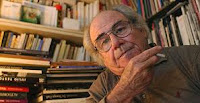One of the last movements of philosophy is called postmodernism. A very difficult theory to break down, because it has been used to describe the changes in art, architecture, philosophy, religion, fashion, dance, literature, culture and feminism. This is where a brilliant audio book can help us. This one i believe is around 2 hours long, but unlike any other audio books out there. The book is called "Introducing Postmodernism" by Richard Appignanesi.
 |
| Cover of audio book |
Most philosophy audio books can be dry, complex and long, but this one is dramatized, funny and breaks you in gently. Well worth a listen, especially on one of philosophy's most difficult subject. I am hoping that one day the introducing series will bring out an audio on chaos theory or quantum theory, which they actually have in book form.
The book by its title is a beginner’s guide to a very difficult subject. Postmodernism is usually a critic about where all the modernist changes have brought us, but not only is it a reflection, its mainly aim is an eternal regress to state that things will always change. I think through postmodern views of literature, there is no absolute truth, no big idea. We must have a world view, rather than a dominant European view.
We need to take note of other cultures, the minority. If rationality was the biggest and best idea, what has it brought us to so far? Postmodernism attacks science as the main aim for the brightest and cleanest way for improvement of society and it also seems postmodernism attacks itself. Many of those who may champion postmodernism actually state they are not even postmodernists, while others would go so far to mention that postmodernism attacks itself.
The audio book tries to cover all areas of postmodernism. The audio book mainly covers postmodernist views on language and art, and then it goes onward to look at architecture, capitalism and music.
Most people out there will recognise postmodernism through changes in art since they are easier to see. Also when you manage to get hold and listen to the audio book, once finished, go out and recognise what buildings are postmodern, what ones are modern and what buildings are from an earlier period. That is another way to examine postmodern attitudes.
 |
| Its not cheap and makes an impact, but is it postmodern? |
The audio book introduces theories from Jean Baudrillard, Jean Francois Lyotard, Roland Barthes, Jacques Derrida and Michel Foucault. There are many more included and you might recognise why some of these famous names were mentioned in this book. Oddly enough most of the theorists here are French, but it might be at the time the French school of philosophy was moving away from the existential period brought on by Jean Paul Sarte and moving into structuralism.
 |
| Jacques Derrida |
 |
| Jean Baudrillard |
Structuralism attacked the idea of existentialism in stating that we cannot always be possible free to do what we want, by its very name, structuralism states there are structures to society, institutions and economic systems. There are structures even to gender and power positions. People in poverty cannot always escape their means, women cannot always redefine themselves because of how men have structured women's role.
Postmodernism thus notices these structures and begins to attack them. It attacks the structure of the institution; this is where Michel Foucault comes in as he attacks the idea of how we separate the mad, the criminal and minority so in order to control them. Michel attacks even knowledge itself as a power base, stating that those who have education use it only as a means to power. Postmodernism attacks gender roles and even attacks feminists, but there are parts of postmodernist ideas that boost feminism. Oddly enough postmodernism attacks itself. As soon as you get close to the idea of postmodernism, it begins to change, to warp and what is now modern becomes postmodern again.
 |
| There is no main view, so where are we? |
One thing to note about postmodernism is that some of its ideas seem strangely out of tune with reality, we get from Jean Baudrillard that The Gulf War of 1991 did not take place or that women as gender do not even exist because man has become so dominant that women can only define themselves as of how men define women. Most people view such ideas as rubbish and out of touch, how can the gulf war not take place, Women do exists and the author is not dead, but one thing we have to note is that postmodernists are not only trying to convince the public about the changes in society, but they are at the same time in a battle with other philosophers and intellectuals where ideas have become so complex that at first their ideas do not seem to make sense. Postmodernism is worth checking out, even if it is just a way to know your enemy.
Hopefully this audiobook will break things down, but the theory postmodernism is vast. There are free postmodernist lectures on itunes, but most will cover postmodern religion, mainly Christianity which allows the theory to challenge its structure base. Other religions are resistant to the postmodernists view e.g. The statanic Verses by Salman Rushdie, but then rightly so, because is there really a bird’s eye view of all cultures and relgion? Perhaps no.
No comments:
Post a Comment